Most Controversial Indian Advertisements
>> Tuesday, March 16, 2010
Judging an Ad as being suggestive, irrelevant in terms of the product its trying to sell or simply controversial is purely relative one may think. What may seem like a vulgar ad to the ASCI (Advertising Council of India) may seem innovative or appealing to the consumers or at least that is what has been proved over the past 2 decades of Indian Advertising!
Most companies, that have made controversial ads that have either been banned from transmission or made to be released in highly censored forms, have recorded highest turnovers and improved market shares post the release of the so called “inconsumable” ads.
Do companies then consider controversial ads the easiest route to Indian public’s mind? Well, if the very aim of an ad is achieved then one would say, why not?
Over the years, if Indian advertising companies have realised one thing its nothing but the fact that “Sex sells” and appeals more to the masses than maybe a good humorous creative commercial. Sex may indeed sell to the public and the masses of India but the Indian Advertising council and other associated legal authorities are not willing to buy the concept that easily. The Indian Advertising industry has seen many a controversial ad in the past 2 decades and most of them creating controversy on the basis of being vulgar, obscene and unfit for public consumption.
Speaking of controversial ad’s, vulgar and obscene may not be the only reasons for raising an eyebrow or shaking up the authorities. What companies have also tried and experimented with often is brand infringement. Explicitly referring to another company’s product in an ad, either by boldly referring to the product or by using parts of its tagline, or any other means through which an attempt is made to hurt the company’s brand value, is considered strictly out of the rule books of fair advertising.
The 90’s and the current decade have had their share of some of the most controversial ads in the history of Indian Advertising – from naked models to steamy showers – we have seen it all! There may have been many that created a little ignorable noise, but following are the ones that stood out and got noticed.
Name: Reebok (Reetone)
Year: 2010
You know India is really coming off age when you see hoardings of tantalizing, perfectly toned bottoms on buildings in major commercial complexes. I am not sure if they have or will run into trouble but posters for Reetone by Reebok are certainly going to change the landscape.
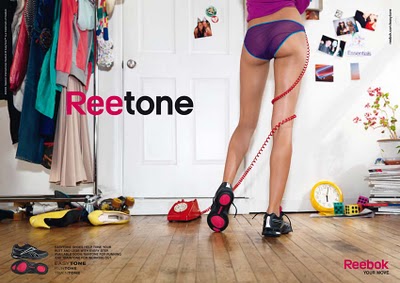 |
| From Most Controversial Indian Advertisements |
Name: IPL 3 - Virgin Mobile (www.IndianPangaLeague.com)
Year: 2010
These are some of the most funny and explicit IPL advertisements by Virgin Mobile. The idea is to take panga with a rival team and get dirty in a war of words. The concept was marketed as IPL or Indian Panga League at www.IndianPangaLeague.com, the ads are mostly beeped and names of actual players are used in every other joke.
Name: Ghost of Bipasha's Past (Bipasha Basu Topless)
Year: 2010
This advertisement surfaced out of nowhere in 2010 to create some controversy as actress Bipasha Basu is seen topless in this advertisement from the 90's.
Name: Maharajas Express Ad (Indian Railways Blunder)
Year: 2010
When an Indian Ad agency cannot get the Indian Map right, it sure deserves nothing but blacklisting! That’s exactly what happened when the print ad for the Maharajas express showed Delhi in Pakistan and Kolkata Floating somewhere in the Bay of Bengal. Apart from this few other cities like Agra and Gwalior were also geographically misplaced. It was India like we had never seen it before!
The Eastern Railways expressed its sincere apologies and claimed that the Ad it had approved did not have the same errors.
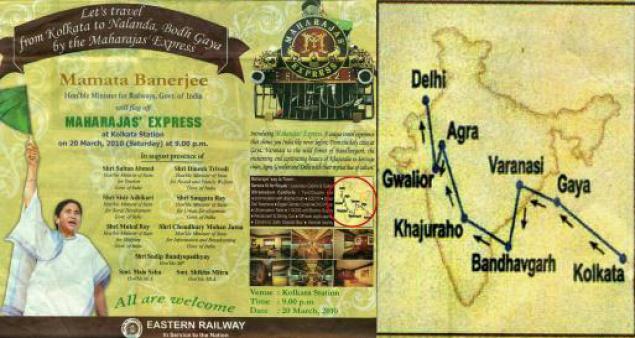 |
| From |
Name: Pakistan Police's Copying Act (Ad Featured With Punjab Police's Logo)
Year: 2010
It’s sometimes the lack of attention to little detail that ends up creating some of the biggest controversies. On March 19th 2010 in Islamabad, an Advertisement in the newspaper by the police in Pakistan’s Punjab province featured the logo of the police of the Indian state of Punjab. It’s still unknown if this blooper was committed intentionally or unintentionally but the similarity between the logos can by no means be an excuse for the blunder.
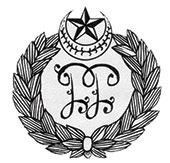 |
| From |
 |
| From |
Name: National Girl Child Day (Indian Advertisement Features Pakistani Air Chief)
Year: 2010
This ad seemed more like a “pick the odd man out” game we played in junior school than like an ad against female foeticide.
Tanvir Mahmood Ahmed’s picture stood out so boldly amongst the Big and Famous Indians namely – Kapil Dev, Sehwag, Manmohan Singh and Sonia Gandhi, it was difficult to let this error go unnoticed even if you tried! Indians all over were shocked but the Ex-air force chief from Pakistan believes it was an innocent mistake on the part of the advertisers. Whether it was innocence or ignorance is yet to be proven!
 |
| From |
Name: Rin vs. Tide
Year: 2010
One reason an ad can fall into the hands of controversy is because it is obscene or vulgar and conveys a sexual message and the other reason is Brand Disparage. Rin in its new ad was bold about its reference to Tide brand not only by using parts of the Tide ad tagline but also by prominently featuring a tide packet. A boy wearing a sparkling white shirt goes up to a lady who uses tide and asks her "Aunty Kyun Chaunk Gayi" with obvious reference to the Tide's caption "Chaunk Gaye!” The Ad is not banned but has certainly raised questions of whether Rin is correct or wrong in trying to sell its product by hurting the brand value of Tide, which would mean a case brand infringement.
Name: Kings XI Punjab Vs. Bhagat Singh's Family
IPL is never short of controversies, amongest the zillion others including the sacking of Lalit Modi was one involving the family of freedom fighter Bhagat Singh and the Kings XI team over an advertisement in the local papers.
http://timesofindia.indiatimes.com/entertainment/tv-/Bhagat-Singhs-kin-sues-Kings-XI/articleshow/5690099.cms
Name: Olay Fairness Cream (Featuring Kajol)
Year: 2009
One look at Kajol is this advertisement and I was confused about 2 things (1)this cream must be really effective (2)how much photoshop work would have gone into making her look like she does
Take a look at this commercial and compare it with the song from Yeh dillagi (90's) to get an idea of just how effective new Olay really is.
Name: IIPM Print Ads
Year: 2007 to date
The Indian Institute of Planning and Management (IIPM) has been in the limelight for a few years now and certainly not for the right reasons. The Indian Business school has been under the scanner for its frivolous ads claiming its tie-ups with the top business schools in the world like Cambridge and UC Berkley to name a few. The MBA channel and Indian magazines like Career 360 have been watching the institute closely over the years and on digging deep into its practices and ethics have come up with some rather shocking facts. Firstly, most students are not aware of the true picture and only have their bubbles bursted after they have enrolled for a so called ‘premier’ MBA course by which time it’s too late to step back. Secondly, most claims about associations with renowned universities has proved to be false – For example the false claim of an association with Stanford in 2007 was completely denied by the Stanford authorities and they confidently stated that they had no association whatsoever with IIPM.
Considered the biggest fraud Institute in the country by some and ‘the next best thing’ in the world of management education by others, IIPM certainly needs to take a stand as to where it draws the line between ethics and profit.
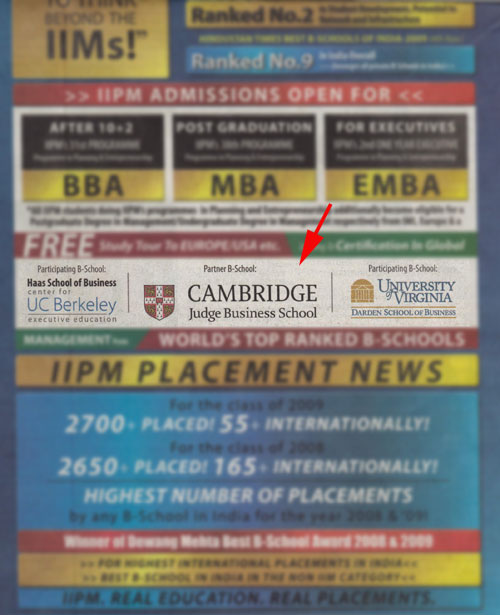 |
| From |
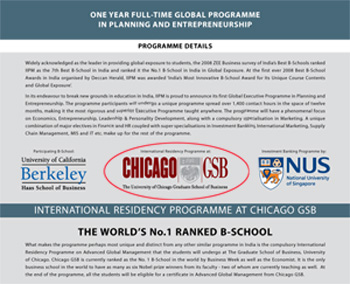 |
| From |
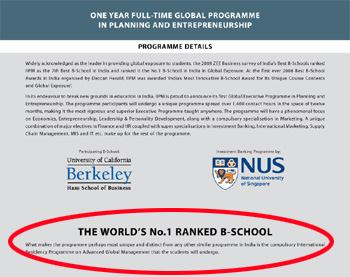 |
| From |
 |
| From |
Name: Haagen-Dazs Ice-Cream
Year: 2009
Haagen-Dazs is in the elite list of Ice-cream brands world over and its entry into the Indian market teed off with the perfect controversy. Things didn’t begin on the best note for the Haagen-Dazs flagship outlet in the capital. The banner outside the store read – ‘preview for international travellers' and ‘Entry restricted only to holders of international passports’.
Bringing the chain to India to tap the Indian market potential and then attempting to keep that very market out? May sound just a little strange and controversial and landed the company in a bit of soup. What ignited the flame? An Indian customer refused entry due to a genuine lack of space. The Revenge – A picture of the banner taken, connected with the denial of entry and posted on the internet for the world to view. There had to be something in it for the offended customer – well he relished his fifteen minutes of fame!
It took quite a bit of convincing to assure the Indian public that the banner was horribly misinterpreted and that hurting the sentiments of the Indian citizen was everything but the company’s aim.
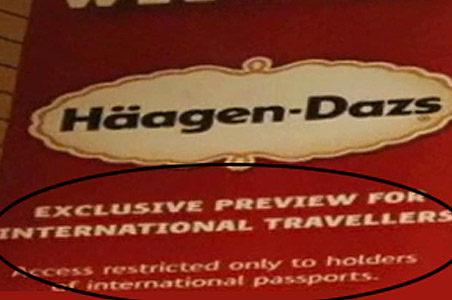 |
| From |
Name: Pink Chaddi Campaign
Year: 2009
The young and the old look forward to this day – it’s the day when towns are painted red, love, feelings and emotions are expressed, Joy is spread and relationships are enhanced – be it a mother-daughter relationship or a couples love for each other. Most people though, call them narrow minded or simply one-track minds, have misconceptions that Valentines Day is meant only for ‘lovers’, people who have a so called ‘boyfriend’ or ‘girlfriend’ and this is exactly the notion that the Sri Ram Sene had in mind.
The orthodox Hindu group, in Feb 2009 threatened to marry off any young couples they spotted together on Valentines day! As horrendous as that may sound it was something the public of Bangalore and Mangalore had to deal with. As a protest to the groups, its thoughts and inhuman attack on the girls in a pub in Mangalore, the Pink Chaddi campaign was born! Pink Chaddis flooded Muthalik’s (member of the Sri Ram Sene) office from all over the country and the campaign that was started by just 4 women sent out the message it was supposed to!
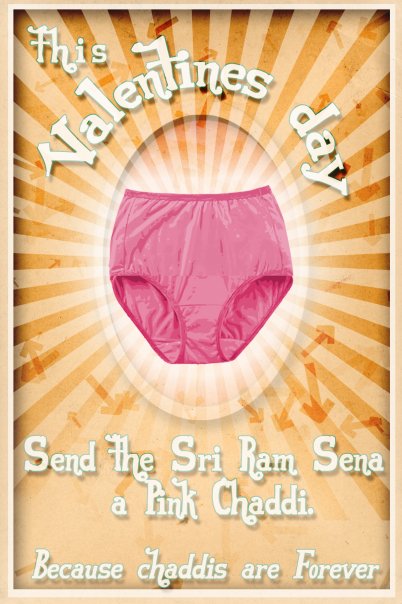 |
| From |
Name: Burger King
Year: 2009
To see the same deity - Goddess Lakshmi - that millions in India and world over worship in their homes, seated on a meat sandwich in a print ad from Burger king was considered truly baffling and disrespectful! The Ad read “A snack that’s Sacred” in Spanish and was created for the promotion of the Sandwich in Spain. Some people believed, and rightly so, that a brand as big as Burger King should be much more aware of religious and cultural sensitivities and how truly repelling such an ad could be to the Hindus worldwide.
Burger King was asked to immediately remove the ad by a US based Hindu advocacy group terming it as “offensive” to the people of faith.
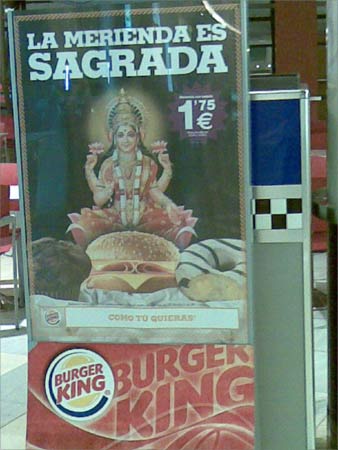 |
| From |
Name: Reliance ADAG VS RIL
Year: 2009
This one is the first of its kind, taking the legal battle to the ‘Aam Janta’. One couldn’t help but take notice as the AD splashed across the first page of a popular newspaper requesting the shareholders of Reliance ADAG to e-mail and sms their comments, a concept that had never been seen or heard before. This one is for the ages.
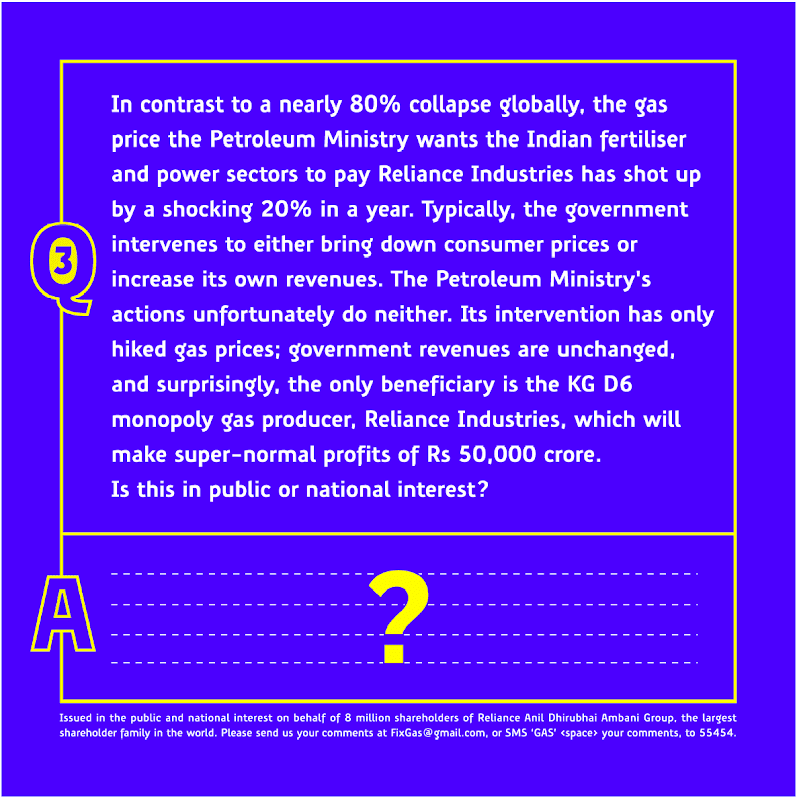 |
| From |
 |
| From |
Name: Kingfisher - Jet Airways and Others
Year: 2008
In 2008, Jet Airways put up a hoarding In Mumbai that read "We've changed" and to this Kingfisher replied "We made them change”. The Change - Both airlines introduced daily flights to New York. Controversial stuff one might think but Kingfisher played it smart. What they got right with this ad, apart from the fact that it was truly brilliant - both in terms of placement and content, is that it did not use Jet's trademark in any manner and it did not disparage Jet's brand name. Jet Airways could not involve the courts, but they almost immediately removed the hoarding.
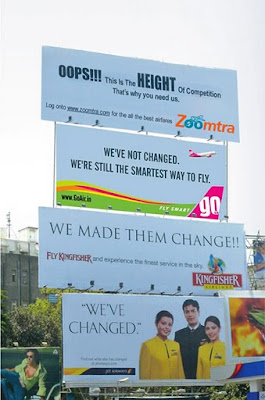 |
| From Most Controversial Indian Advertisements |
Name: VIP Frenchie x Underwear
Year: 2008
A young couple, a trekking expedition, a fun campfire, some playful games in the bedroom, the boy walking out in his underwear from the bathroom and then the obvious. The Ad ends with the couple coming together and the VIP X logo appearing on screen. The message was pretty clear and yet another instance of trying to sell using sex as a medium.
Name: UNIBIC India - Great day Biscuits
Year: 2007
UNIBIC in 2007 crossed the reasonable bounds of creativity with the launch of their Biscuit "Great day" which was accompanied with the tagline "Why have good days, when you can have a great day!”. The biscuits may have been great, good or whatever, but the Bangalore City Civil court thought the advertisement wasn’t that great and issued an Injunction order and restrained Unibic from creating any further ad's that hurt the Good Day brand name in anyway.
 |
| From |
Name: Amul Macho Undergarments
Year: 2007
This Ad is rated as one of the most controversial in India and for the most obvious reasons was banned by the Advertising council. "Ye to bada toing hai.." is rated as one of the most vulgar and sexually explicit ads in the history of Indian advertising. This ad, with the women making suggestive movements as if she is up to something naughty, although banned, increased the market share of the company sharply with a turnover of Rs. 201 crores in 2007-2008.
Name: Wild Stone Deodorant
Year: 2007
An Ambitious company in West Bengal believed that sex would sell for them and it indeed did! The uncensored ad is available on You Tube and has been viewed over 8 lakh times. A company that was virtually unheard off, made its presence felt thanks to the controversy surrounding this ad. The ad, shot during Durga Pooja, depicts how a homely bengali lady bumps into a hot man and the Wild stone deodorant takes them into fantasy land. The ad certainly justified the tagline "Wild by Nature" and although the ad was not banned, a highly censored version was aired on television.
Name: Lux Cozy
Year: 2007
This Ad was given an all clear signal by the ASCI when it was under question but the Ministry of Information and Broadcasting banned transmission or re-transmission of the ad on the grounds of being indecent, vulgar and suggestive. A hot man clad only in his Lux Cozy underwear is chasing a dog who pulled away his towel and then this scantily dressed woman comes up to him and gives him a peck on his cheek and thanks him for finding her dog. All of that and then a very naughty look at the boy and she walks away! The man for obvious reasons is considered lucky and the ad ends with the the tagline "Apna Luck Pehen he Chalo".
Name: AC Black Whisky - Kuch Bhi Ho Sakta Hai
Year: 2002
Most companies believe in the "Sex Sells" mantra and so did Jagjit Industries in the early 2000's. A woman with her neckline diminishing and a man with his shirt coming off together with the tagline "Kuch Bhi ho sakta hai", was not only the perfect combination for a steamy and cheeky ad but also a perfect calling for a controversy that had some serious financial impact on the company. The commercial was instantly banned and the company's plans of boosting sales during the World Cup, when this ad was aired at regular intervals, were not quite met!
 |
| From |
Name: Cadbury Temptations
Year: 2002
Like Kashmir wasn’t already a sensitive enough topic for India, the Cadbury Temptations ad released in 2002 on Indian Independence day, did nothing but aggravate the sentiments of thousands of people. The ad’s tagline read ‘too good to share’ and was embedded in bold in the Kashmir area of the Indian map – painted red to depict its war-stricken nature. The BJP believed that the ad lacked basic “sensitivity” and threatened to take serious action against Cadbury’s.
That emotive issues like Kashmir were being used in the name of creativity was simply unacceptable and considered an unhealthy way of promoting a product. Cadbury’s India Limited owed the country an apology and it stated in its apology that the ad was issued “entirely in good faith, with no intention whatsoever to offend the sentiments of the public".
 |
| From |
Name: Bisleri - Play Safe
Year: 2001
When Bisleri went from "Pure and Safe" to "Play safe" in 2000, it hoped to target the youth and convey a social message. According to Ambience D'Arcy, the shift had been necessitated by the fact that every new entrant in the mineral water market adopted the purity. "Our observation is that people consume mineral water not for the minerals, but for safety. Hence the word "safe" is critical." said Chauhan. The idea certainly differentiated Bisleri from other brands but the Woman, the beach, the man and the whole hidden idea of "safe sex" didn’t quite sell well and the ad, as most would have expected, was banned.
 |
| From |
Name: Levis - Low Rise jeans
Year: 2001
Levis has always positioned itself as a 'youth' brand and with this advert they just proved how well the concept of sex sells. The oomph factor exhibited by the sexy women in the ad was mainly targeted at women who wanted to look more erotic and sexy but the ad did more than just that. The ad boosted the sales of Men's jeans as well which was completely irrelevant. The ad was not banned but the almost semi-naked women in it did manage to create quite a controversy for the ad makers.
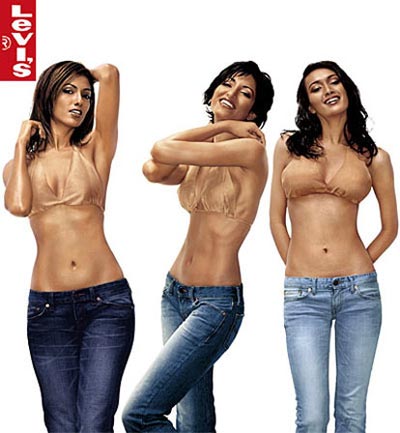 |
| From |
Name: Tuff Shoes (Featuring Milind Soman and Madhu Sapre)
Year: 1995
This one has to be one of the most controversial print ad's India has ever seen! In 1995 when Milind Soman and Madhu Sapre posed nude for the Tuff Shoes Ad campaign, they probably never saw a 14 year long court case ahead of them. 2 bad pairs of shoes, a python and 2 nude models got various women's groups fuming ,the models slapped with a case of obscenity and the ad deemed unfit for public consumption!14 years later in 2009,the models and the others involved were finally acquitted and all charges against them dropped.
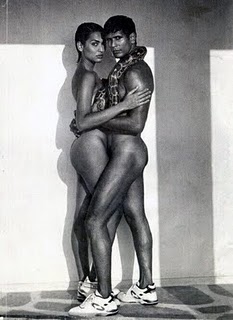 |
| From |
Name: Calida Underwear (Featuring Dino Morea and Bipasha Basu)
Year: 90s
If the Ad makers of this one thought they would get away with Dino Moreo tugging Bipasha Basu's panty with his teeth, they were everything but correct! The then Minister of State for Cultural affairs, Mr Anil Deshmukh found the ad a little to hard to handle and for obvious reasons it was added to the long list of 'Banned Indian Commercials'. Like the picture didn’t have enough ingredients to stir up a controversy, the tag line- "And you thought your appetite for indulgence could only be whetted by Swiss chocolates", as one would say added the right amount of fuel to the fire!
 |
| From |
Name: Kamasutra Condoms (Featuring Pooja Bedi)
Year: Early 90s
The early 90’s are famous for its long list of controversial commercials and this one was no exception. The steamy and sexy commercial featuring Pooja Bedi and Marc Robinson was a little to hot to handle for the legal authorities and was instantly banned. Pooja Bedi's seductive shower that attracts Marc Robinson was all a bit too much to digest and as most would have expected the commercial was banned and prohibited from transmission.
Name: Mr. Coffee (Featuring Arbaaz and Mallaika Khan)
Year: Early 90s
This ad helped Mallaika and Arbaaz write their future in an instant but everything else about the ad ended right there. The concept of good coffee explained through a "sexy" commercial was not very well understood by the legal authorities of India. The tagline, "Real pleasure can't come in an instant", and the commercial, due to its sexual overtones generated quite a controversy in the early 90's.
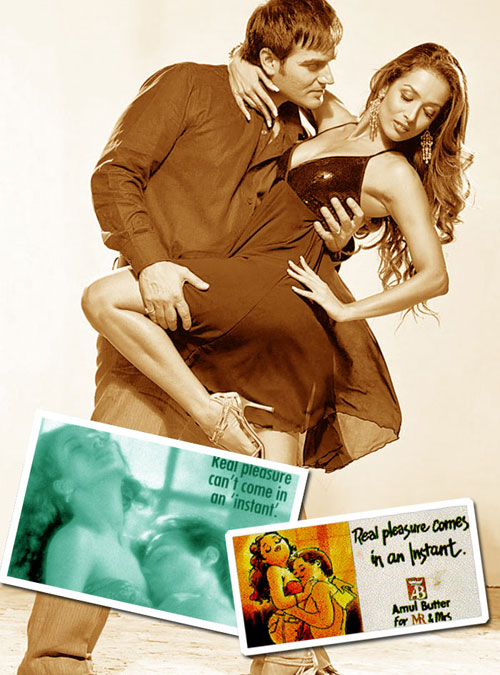 |
| From |
Name: Air India
Year: 1966
This Ad was banned as soon as it was launched in 1966.
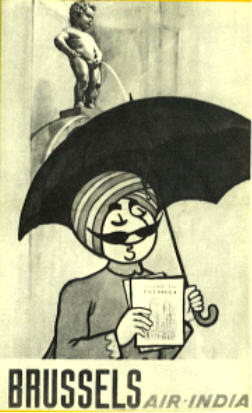 |
| From |












